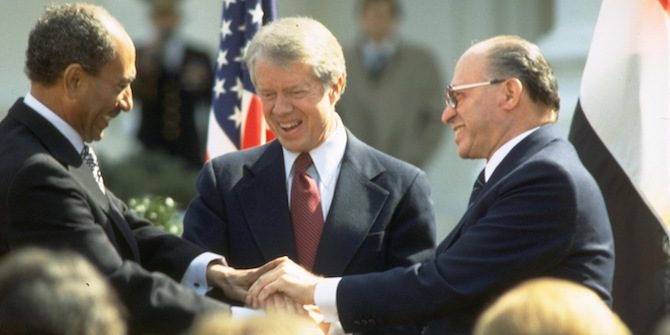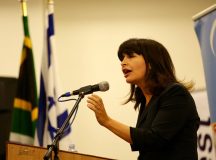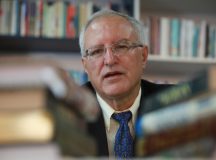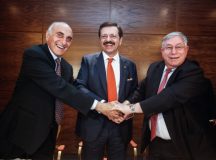At a watershed event in London last November, 32 prominent civil society figures from 15 Arab countries publicly repudiated the boycott of Israel. The group, calling itself the Arab Council for Regional Integration, argued that the long-running boycott has only harmed Arab countries and undermined the Palestinian cause. The conference concluded with calls to engage Israelis for the sake of developing the region, strengthening Israel’s peace camp, and laying the foundation for a Palestinian state.
Speculation followed as to whether and how the nascent Arab Council would begin to act on these ideas. The answer came on 11 February, when the group reconvened in Paris to strike at one of the major obstacles to its agenda: Arab ‘anti-normalisation laws,’ which prescribe prison or death for Arabs who meet an Israeli citizen. At French National Assembly headquarters, Arab Council members from Algeria to Iraq — including Egyptian MP Mohammed Anwar El-Sadat and former Kuwaiti information minister Sami al-Nesf — called on democratic governments to clear a path for peace by enacting consequences for Arab powers that block people-to-people relations. Some members’ testimony to the Assembly signaled future plans to breach the boycott within the region.
The Arab Council poses a challenge to a widely held assumption about the state of Arab-Israeli relations. Amid signs of warming between the Jewish state and various Sunni Arab powers, most observers perceive Arab leaders as inclined toward peace but restrained by their rejectionist populations. Yet the strand of Arab public opinion represented by the Arab Council favours faster progress toward rapprochement than most Arab governments are willing to allow.
To gauge the group’s reasoning and plans, Fathom Journal spoke with Mostafa El-Dessouki, one of its co-founders, and director of Arabic communications at the Center for Peace Communications.
Fathom Journal: Please explain the Arab Council’s case against the boycott of Israel.
Mostafa El-Dessouki: Arab countries have been boycotting Israel’s people since before the Jewish state was born and have suffered for doing so at every turn. When we dispossessed and evicted 900,000 Jews indigenous to the Middle East and North Africa, we lost their formidable talents and capacities and disgorged a piece of our collective soul. We then tried to isolate the country to which most of them fled — but today Israel is a political and economic powerhouse, thoroughly integrated into the global economy, whereas most Arab countries are comparatively isolated from the world. The boycott did worse harm to Palestinians: Though the ones who sought to fight Israel found backers in Arab lands, the many Palestinians who preferred to build the civil foundations of a future state found no support from the same countries. Worse still, the boycott became a template for further, intra-Arab boycotts that exacerbated conflicts within and between many states, helping to tear the region apart.
FJ: How widespread is this viewpoint in Arab countries?
Mostafa El-Dessouki: Millions of Arabs share the desire to overcome the culture of boycotting and bring all the region’s peoples together — including Israelis — in the name of development and peace. In Iraq, where a recent poll showed 40 per cent favouring relations with Israel, this view transcends the Shi’ite-Sunni divide. On social media, where thousands of young people from Libya and Sudan to Saudi Arabia and the Gulf have called for Israeli embassies in their respective capitals, the sentiment manifests in monarchies and republics and in war-torn states and stable autocracies alike. This growing pan-Arab trend remains a minority trend, to be sure. But after four generations of antisemitic brainwashing — and amid continuing Israeli military authority over the West Bank and Gaza — the fact that it finds robust public expression is remarkable. Arabs who call for civil engagement with Israelis do so in the face of enormous social and political pressure. I think their courage stems from heightened awareness, in an interconnected world, that there are more effective models for relating to the ‘other’ and resolving conflict, and we must try a new approach lest we fall even further behind.
FJ: How do you respond to the concern that the Arab Council effectively validates the belief, espoused by the Israeli hard-Right, that Israel can build relations with Arab countries without ceding territory or sovereignty to the Palestinians?
Mostafa El-Dessouki: Israeli extremism did not arise in the tolerant, integrated region we envision. It was born over decades of pan-Arab rejectionism and demonisation of Jews and their state. As Dennis Ross observed recently: ‘It is a matter of human nature that hostility and exclusion breed anger and intransigence, whereas friendship and inclusion enable compromise and trust.’ We believe not only that the boycott strengthened extremists within Israel, but also that, conversely, a more integrated region will empower the Israeli peace camp. Consider that the offer of a genuine peace by Egyptian President Anwar El-Sadat swayed an Israeli government that had previously been derided as ‘extremist’. Since we launched the Arab Council, moreover, evidence has emerged that our own efforts are registering a similar type of effect. Witness the series of publications in Israel urging Israelis to emulate the Arab Council within their own society. According to their author — Ksenia Svetlova, a former Knesset Member and now senior fellow at the centre-left Jerusalem think tank Mitvim — ‘Israel could benefit from a similar initiative of its own, which would aspire to promote a moderate and balanced view of Palestinians, Arabs, and Muslims in Israeli media, politics, and society.’ She added, ‘It is time that Israelis, too, understand and believe that we are an inseparable part of the Middle East, that we do not live on a lone island, and that despite the clear difficulties, cooperation with the region is feasible.’
Among the Arab Council’s supporters on social media, I might add, are Palestinian youth in Gaza who took to Facebook to hail the initiative. They know personally the wages of exclusion, and recognise that we are trying to open a new path for them as well.
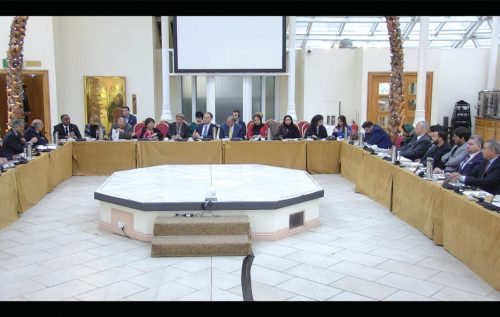 (Arab Council gathering. Photo courtesy of Joseph Braude).
(Arab Council gathering. Photo courtesy of Joseph Braude).
FJ: The Arab Council delegation to Paris trained the spotlight on the region’s ‘anti-normalisation laws.’ How widespread are these laws?
Mostafa El-Dessouki: All Arab states have in one way or another criminalised human relations with Israeli citizens. Egypt and Jordan are semi-exceptions that prove the rule: though their penal codes no longer address the issue, state-backed religious edicts banning human contact with Israelis enjoy the force of law. Nor does any Arab government limit itself to the courts in punishing people who meet Israelis: extra-judicial measures include summary imprisonment, revocation of citizenship, and state-driven media campaigns to incite against and publicly ostracize the ‘offender’.
Anti-normalisation laws cast a pall on the Arab Council’s inaugural gathering in London. To protect our members, we chose not to invite Israelis to attend or participate in any way. Some journalists who covered our initiative noted the irony of a conference about ending the boycott that itself excluded Israelis. But it was necessary to do so in order to limit our members’ legal exposure. Before the conference even convened, several Egyptian members were warned by their government that they would face grave consequences if they participated. (Most of them chose to join us anyway.) After it concluded, Sheikh Saleh Hamed, an Arab Council member from Lebanon, returned home to face a campaign of incitement and intimidation orchestrated by Hezbollah, which dominates the state and most media in that country. These two examples reflect the fact that civil engagement between Arabs and Israelis is opposed by Western allies and adversaries alike in the region — and all of them think they can torment citizen peacemakers with impunity.
FJ: It is striking that the Egyptian government, Israel’s peace partner of 40 years, would try to block an initiative that falls well within the bounds of its own treaty. Why would friendly Arab governments punish their own citizens for doing what they themselves do already?
Mostafa El-Dessouki: Because they want to monopolise the relationship with Israel. The moment an autocrat discovers the value of ties with Israel, he fears that his rivals will acquire it too. This is the logic that leads Arab governments at peace with the Jewish state to tolerate and even stoke the demonisation of Israel within their borders: such brainwashing turns citizens into enforcers of the state monopoly.
FJ: To take that logic a step further, the Arab Council, in advocating civil engagement, would be at loggerheads with any Arab government that cooperates with Israel, whether overtly or covertly, because you seek to break their monopoly on the relationship. Is that correct?
Mostafa El-Dessouki: It is not correct, because the logic we are talking about is flawed to begin with. The policy of ‘cold peace’ has demonstrably backfired on Arab governments. In every country where the leadership cooperates with Israel, whether officially as in Egypt and Jordan or unofficially as in certain Gulf states, civilians, long brainwashed to hate Israelis, have proved vulnerable to jihadist recruitment. A jihadist need only point to the ruler’s relationship with Israel as a means to incite violence against him. When we advocate an end to the propaganda that engendered such problems in the first place — and when we call for a new policy of engagement that will vest Arab publics in the relationship with Israel — we are protecting Arab establishments from their real adversaries.
FJ: But these establishments don’t see it that way, do they?
Mostafa El-Dessouki: No establishment is monolithic. Everything I just said finds sympathy within the halls of Arab power, even as it also finds antipathy. Our sympathisers as well as our detractors know that public opinion is evolving in the region. We are doing our part to help it evolve in a positive direction.
FJ: If part of your goal is to roll back the mass brainwashing you refer to, how can you achieve that without buy-in from the region’s government-backed media outlets and schools?
Mostafa El-Dessouki: Indeed, we aim to win that.
FJ: Is that a realistic goal?
Mostafa El-Dessouki: Some Arab states have already begun to signal a new and positive direction in official discourse on Israel and Jews. Up until now this discourse is primarily projected outward, to Western countries, in the context of an appeal for greater Western sympathy and support. State-backed media and education in Arabic remain essentially unchanged. What progress we are seeing within the region remains primarily a grassroots, social media phenomenon. The Arab Council calls on Arab states to apply the same improvements they are making in foreign-language communications to their Arabic outlets, and we have a plan to encourage that.
FJ: What can you tell us about this plan?
Mostafa El-Dessouki: I would cite the testimony of one of our delegates to the French National Assembly in Paris, Algerian journalist Sami Baziz. By way of context, delegates were describing their envisioned partnerships with Israelis in economic, cultural, artistic, and other realms. Here is what he said:
In my country, the media continues to traffic in antisemitic stereotypes and conspiracy theories about Jews and incite violence against Israeli citizens and Jews generally. For generations, such content has served as a tool to deflect blame for domestic problems of corruption and human rights abuse. It fostered a mentality of defeatism and contributed to a culture of extremism. It has made it more difficult for us to solve our own problems and maturely engage our neighbours and the world around us.
I envision a project to reform this practice by educating the next generation of media in Algeria. The goal would be to introduce honesty about Israel, its people, Jews, and their faith. I believe that doing so will make a contribution to civil peace within Algeria and a broader peace in the region. It will also enable us to think about our own local challenges analytically and constructively, and thereby envision realistic solutions to our problems.
It would be natural, in embarking on such a project, to engage with experts in Israeli and Jewish history, as well as experts in the field of media reform. Many of these are of course Israeli citizens. Yet the laws of my country prohibit me from even meeting them, let alone partnering with them. We need to overcome this problem, and that is why I am here today.
FJ: This brings us back to the Arab Council’s delegation to the French parliament that took aim at Arab ‘anti-normalisation laws.’ How will a European legislature help you repeal an Arab law?
Mostafa El-Dessouki: That is not our immediate objective. As I mentioned earlier, the ‘anti-normalisation laws’ are one of several forms of oppression for those who seek civil ties with Israelis. We want to stop the enforcement of these laws, as well as the extra-judicial retribution which Arab civil peacemakers also endure. We have seen in other contexts that when international attention is brought to bear on infractions of basic rights in Arab countries — human rights, freedom of expression, freedom of conscience, and so on — the attention sometimes deters Arab powers from violating them. I grant you that that is often not the case. But we believe that the issue of Arab-Israeli civil engagement is one where such attention can indeed deter some government retribution. The reason is that, as I mentioned earlier, now is a time when numerous Arab powers are courting Western goodwill by signalling openness toward Israel. For that matter, even Arab powers backed by Iran are locked into a give-and-take with the West in order to mitigate the effect of sanctions.
FJ: So, if your goal is simply to garner international attention, why address a parliamentary body in particular, as opposed to another public forum?
Mostafa El-Dessouki: We chose a parliament because it is capable of passing its own laws. It can enact consequences for Arab powers that punish citizen peacemakers.
FJ: Such as?
Mostafa El-Dessouki: Many Western legislatures mandate their governments to issue annual reports on human rights abuse, money laundering, human trafficking, and terrorism. We feel that they should also, as a matter of routine, report on instances of Arab government retribution for those who call for peace or meet a potential partner in peace. Such reporting would name and shame the perpetrators, as well as acknowledge any positive steps a government takes to foster people-to-people relations with Israelis. In doing so, it would present both a disincentive to continue the oppression and an incentive to make progress.
FJ: Why France?
Mostafa El-Dessouki: The founding principles of the French republic are liberty, equality, and fraternity. That is the essence of our agenda. France in turn is the flower of the European Union, which stands for human dignity and human rights, freedom, democracy, equality, and the rule of law.

